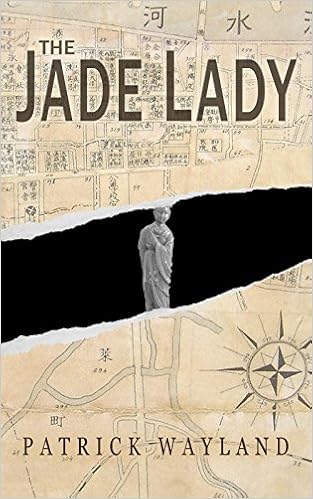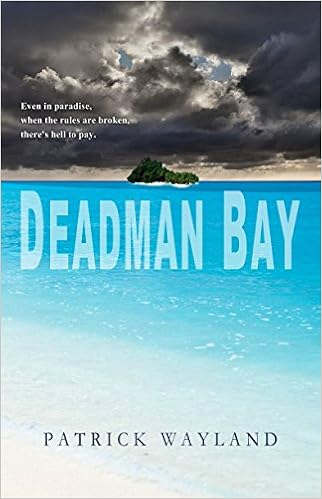Patrick Wayland is the author of three novels: The Jade Lady (2012), Deadman Bay (2015), and The Nialhaus Proxy (2016). He was born in Corpus Christi, Texas, graduated from The University of Texas at San Antonio, worked in Silicon Valley in the high-tech industry, and later studied Asian languages in Hong Kong and Taiwan. Patrick lives in Taipei.
I really enjoyed your short story, Roger Jergensen’s Flyout, in the Taipei Writers Group anthology Taiwan Tales – One Country, Eight Stories: a Multicultural Perspective. Can you tell us about how the book came together?
That was a true collaboration in every sense. We were having some good meetings, helping each other out with everyone’s own works – working on a broad variety of genres from sci-fi, thriller, flash fiction, essays. Then someone suggested we do an anthology. We all wanted to do it and just needed to decide on the genre. Of course, the topic had to be about Taiwan, but most of the country-related short story collections out there are non-fiction travel. We really wanted to do something different. So we chose to make Taiwan Tales fiction because you can get some really interesting points of view with that. You get to see this projection of what people feel or think about a place; although, there’s still a lot of truth in narrative fiction.
Please tell us about the Taipei Writers Group.
The group has been running since 2010. Like many things, it started slow. Three people. Then one. Then two for a few months. Now we have over three hundred in our Facebook group – usually only four to eight people show up for critique meetings. We’re very lucky to have five or six core members. These are people who are serious indie authors, people who put a lot of time and effort into getting their work published and this gives us a foundation of rock.
Any advice for people thinking of setting up a writers group?
Yes, be persistent. Find the local website for artists or group activities and keep advertising your meeting details there. Find a good coffee shop and a time when it’s quiet. Post that you’ll have a writer’s group meeting there and show up – even if you’re the only one. Do this every week or two. If no one shows up, work on your writing so nothing is lost. Sooner or later someone will see your posts and contact you. If you’re serious about what you do, over time you will attract other serious people.

What was the inspiration for The Jade Lady?
Mostly Taiwan, of course, but also history. I have a big interest in WWII history and the secret history between the ROC and the US, which is never talked about because of political pressure from China. Since the late 1970’s when the USA closed its military bases in Taiwan, America has sort of pretended that it didn’t know Taiwan, but the ROC and USA go way back together. Near Songshan Airport, there used to be a great dive bar, where Taiwan air force personnel would hang out. The walls were covered with photos of jetfighters and pilots. Some of those photos were taken in the US because that’s where many Taiwan pilots went for training. So, there’s all this great history here that people forgot – the Cold War in the East between Taiwan and China, and that was the foundation for Jade Lady. It’s part history, part treasure hunt, and part spy novel.
Why did you decide to set your second novel, Deadman Bay, in the Caribbean?
The story is about a reckless guy who somehow lands a job in paradise as a property caretaker. I’ve travelled around the Caribbean as a tourist and I’ve seen these places, remote island properties, that people can buy – these houses look beautiful, but they are in very lonely places. I wanted to see how isolation changes a person. The Caribbean is also a big corridor for drug runners, so that adds a lot of danger. What would you do if you saw a drug runner boat stop on your island? Given these attributes, Deadman Bay had to be in the Caribbean.

Can you tell us about your latest novel, The Nialhaus Proxy?
Nialhaus Proxy takes place mainly in Silicon Valley, where I worked many years. The main character gets this easy job – fly out to client sites around Asia and set up the company’s security system. During one business trip, he meets a beautiful flight attendant and falls in love. Everything’s perfect… until an FBI agent confronts him and says his company is being investigated. They think the system he’s been installing might be a big virus or something. He’s caught between a rock and a hard place – his predecessor was murdered and he could be arrested – so he has to find out what’s going on before it’s too late.

Does writing come more easily to you with each successive novel?
Of course, the more you write, the better you get at focusing on what’s important – and that’s the story or subject. When you first start, you’re constantly looking at small things like using correct grammar. But in narrative fiction, like poetry, writers break a lot of grammar rules because the rhythm and pacing and feeling of the prose are more important. You try to write like you would speak, because that’s how people hear it in their heads as they read. Writing is like playing a sport. The more you practice, the more muscle memory you develop. When a basketball player throws the ball, he’s not thinking about the details of what his arms and hands and fingers need to do, he’s letting his subconscious take over. So, I do write faster now, letting my subconscious control a lot of the process – at least on the first draft.
What are your writing habits?
Whenever I have a few hours free, I go to a coffee shop and write. I always aim to finish an entire scene in one session. At home, I try to write standing up, following Hemingway’s advice. When I get in the zone, I can spend 3-4 hours working on a chapter. There’s two parts to writing. The first is creative. I try to rush through this, get every plot point and idea down on paper. The second part is editing. You have to put yourself in a more critical frame of mind and polish up the story. I also try to get a lot of feedback from my writing group. Back in the old days, an author would be closely associated with an editor. For indie authors, the writing group – or beta reader – has sort of replaced that vital part of developing stories.
What kind of promotion have you done for your books?
I do giveaways on Goodreads.com as well as putting ads on a few list websites for new books. Marketing sucks. It uses up time that I could be spending punching that keyboard, but as an indie author it’s very necessary to learn about.
What projects are you working on now?
Now, I’m finishing up the first book in a series that involves a heroine who is a FBI Cyber Crime analyst. She solves crimes and goes up against a lot of interesting characters – a secret hacker group, corrupt politicians, an assassin… But farther out, coming back to Asia, I’ve got an idea that’s been simmering in my head – a thriller that will take place in Okinawa, involving the US military base, Yakuza gangsters, and the deep blue sea.
* * *
You can buy Patrick’s novels on Amazon.com.
Read Brendan Cody’s review of The Jade Lady.
Learn more about the Taipei Writers Group.
